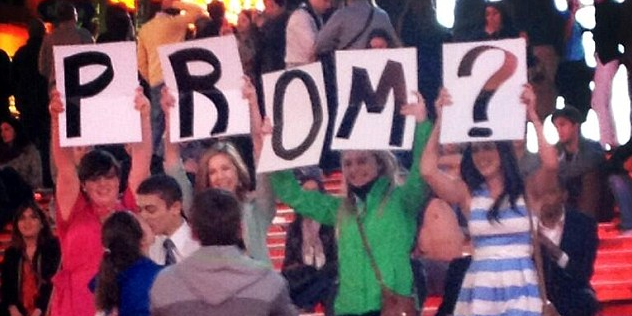Promposals: the new culture of public ritual
By Nico Lang

Promposals: the new culture of public ritual
By Nico Lang
However, this prom season introduced a new ritual to the yearly pageant: the promposal. Although inviting someone to prom is overtly a performative act, these asks add another layer of showmanship to the gesture. Viral videos show students using flash mobs, “Draw Something” or Inception to add flair to the formality, and a YouTube clip entitled “The Senn Way of Asking Someone to Prom” shows a student dancing for his girlfriend in gold lamé hot pants. The word “Prom” is written across his buttocks.
In the age of Facebook and Twitter, young people are constantly being asked to make their private lives a performance, so it makes sense that these asks would move into a public space, where everyone can see your date say yes. It’s like instantly sharing your proposal with all of your friends, letting word of mouth do the work that a Facebook “like” would otherwise.
An interview with New York magazine, however, tells another side of the story. Reporter Maya Kaufman interviewed David, who asked out his girlfriend during an assembly, in front of the entire school. David told Kaufman, “It completely embarrassed her — that was the point — and everyone else loved it.”
The students Kaufman talks to report that traditional norms and gender roles in high school are changing, where boys and girls are now both free to do the asking (although girls rarely do). The public promposal allows young men to take control over the relationship and reassert their self-appointed dominance. One student, Isidro comments that women doing the asking “would feel kind of weird in a de-masculinizing sense; it’s like our unwritten duty.”
However, this re-assertion of male dominance often puts female students in an uncomfortable position, where they feel like they have no choice but to say yes; otherwise, the entire school would be watching you break someone’s heart, a guy who was brave enough to put himself out there in front of everyone. If you say no, you instantly become the villain in a society quick to label women as “bitches” or “ice queens” for unpopular behavior.
For instance, when men propose to women at baseball games, a proposal so common it’s become cliché, the woman is expected to say yes and kiss him in front of the cameras. It’s like getting a rose on The Bachelor; you don’t turn it down. Anything else is a violation of the ritual.
Although it’s gender policing, respondents rarely comment on the underlying psychologies behind it. They are more interested in romance, reenacting the teen movie beats they’ve been taught to expect from movies like Sixteen Candles, Jake Ryan pining for you next to a juiced up Trans Am.
Danica said, “It has been engraved in our teenage dreams that our stud for a boyfriend or the chiseled boy in the front of the class would come and awkwardly ask you to prom, but this is not reality.”
For girls like Danica, the enactment of these promposals give them the “princess” fantasy that many young girls seek out in Disney movies, a feeling that consumerist fever dreams are attainable. When young couples are increasingly waiting longer to get married, having these pre-marriage rituals of romance give young women a taste of the real thing.
From an early age, women are taught to visualize their wedding day and prepare for it, whether that’s in hope chests or wedding magazines. For girls acculturated in this youth bridal culture, promposals are the next step to total wish fulfillment. It’s like taking a peek inside the box.
At a time when many traditional institutions are changing and religious worship attendance continues to decline, these created rituals serve to fill that void. Ritual has come to take the place of myth, which we can see in the explosion of wedding season and the number reality programs devoted to one specific day in your life.
In addition to the rise of “groomzillas,” where men now are expected to take up arms in the wedding wars, the marriage equality movement has served to support the primacy of marriage as a modern ritual. For many gays who didn’t get to go to prom (and still don’t), weddings are a chance to finally have their day—to dress up and pretend that you have it all figured out.
A couple of years ago I attended a group wedding at the Chicago History Museum, after Illinois passed Civil Unions. The day was one of the most beautiful of my life, watching couples who had waited years just to say two words to each other; you couldn’t help but cry with them. I initially wondered, however, why you would want to share a moment so personal with 500 couples.
Then it hit me. That day was like uploading your wedding photos with 500 of our closest Facebook friends, getting to instantly “share” the moment. What’s the point of being a part of history if everyone isn’t watching you? Whether it’s a YouTube proposal or your wedding day, it’s not just about romance. It’s about making love public.
Nico Lang writes about LGBTQ issues in Chicago. You can find Nico on Facebook, Twitter and Tumblr.
